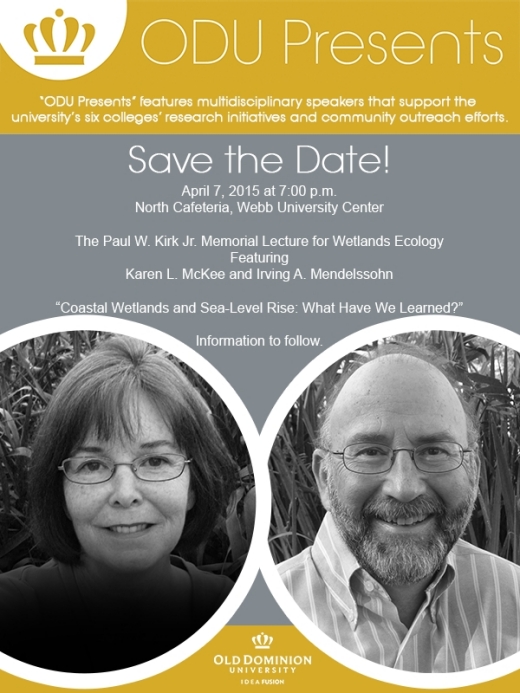Kirk Lecture for Wetlands Ecology Honors Late ODU Botanist
During his long career at Old Dominion, the late biologist Paul Kirk drove research in, among other studies, the biological remediation of oil spills within marine ecosystems.
It's fitting, then, that wetlands preservation is the foundation of a lecture and research program Kirk's son, Allan (ODU '83, biology), founded to honor his father.
The Paul W. Kirk Jr. Memorial Lecture for Wetlands Ecology will be held Tues., April 7, featuring two botanists who co-founded The Wetland Foundation.
Irving Mendelssohn and Karen McKee will address "Coastal Wetlands and Sea-Level Rise: What Have We Learned?" at 7 p.m. in the North Cafeteria of the Webb University Center.
The lecture is part of the "ODU Presents" series of multidisciplinary speakers that support the University's research and community outreach mission. Admission is free and open to the public, but seating is limited. Guests who wish to attend are asked to RSVP to (757) 683-3116 or online using event code PKL15.
Paul Kirk, then professor emeritus of biology, died in November, 2013 at age 82. He taught at ODU from 1971 until his retirement in1992; serving during that time as associate dean for the College of Sciences and Health Professions and as director of the biology masters degree program.
Allan Kirk is chairman of surgery at Duke University with expertise in transplant immunology that is internationally recognized. A gift from Kirk and his wife, Robin, made the lecture and future research possible.
Mendelssohn is professor emeritus and research professor of oceanography and coastal sciences - and adjunct professor in biological sciences - at Louisiana State University.
He has conducted global wetland research since 1971, served on numerous scientific panels and published more than 140 scientific papers.
Recently, Mendelssohn's research has emphasized the restoration and sustainability of coastal wetlands, analysis of the causes of vegetation dieback in coastal marshes and the effects of multiple stressors - such as sea-level rise, eutrophication, oil pollution and salt-water intrusion - on the ecology and restoration of coastal wetlands.
McKee is a scientist emeritus (retired) with the U.S. Geological Survey, and also an adjunct faculty member at Louisiana State, who has conducted research in wetland plant ecology for 40 years. A fellow of the Society of Wetland Scientists, McKee studied the effects of elevated CO2, sea-level rise and hurricanes on wetlands in the Mississippi River Delta and around the world.
Her work has been published in more than 100 peer-reviewed journal articles and books. Along with Mendelssohn, McKee founded the non-profit Wetland Foundation, which provides travel grants to students in wetland science to attend conferences and conduct field studies.
At the Webb Center lecture, the scientists plan to discuss the major types of coastal wetlands found worldwide, their benefits to society and the factors that threaten their existence.
Specifically, they will focus on the effect of sea-level rise on low-lying coastal areas such as Hampton Roads, what processes determine whether wetlands like mangroves and salt marshes can keep pace and how human activities may influence coastal resilience.



